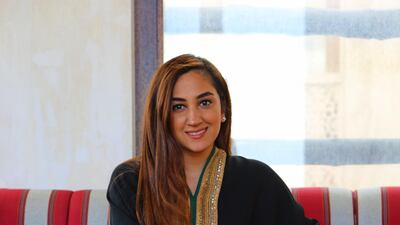The evolution of the Emirates Airline Festival of Literature is not limited to the calibre of authors attending – it also extends behind the scenes, with a new director in charge.
With former head Isobel Abulhoul having taken on the role of chief executive of the festival’s parent body, the Emirates Literature Foundation, the festival now has a dynamic new face with Ahlam Bolooki in charge.
There is no need to ask if she has big shoes to fill, Bolooki can still see them – literally. “Isobel and I share an office, so she is not that far away,” she says. “We work very closely and share lots of ideas on finding different ways of bringing different literature opportunities to the community.”
Bolooki isn’t a completely new face to the festival. The Emirati director emerged into the top job after managing its youth programme – arguably the heart and soul of the event – in previous years. Bolooki’s prior experience includes work as head of Dubai Tourism’s regional campaigns. It is that marketing know-how, along with a life-long interest in the written word, that she would like to bring to her role.
“We have a great 10-year track record and now I have to think about the next decade,” she says. “It is now about taking something that is a success and taking it to the future. And that means looking at the ingredients that are required to keep it strong and flourishing and to tap into new audiences.”
It’s more than just a festival
A key demographic that Bolooki hopes to target during her tenure is the youth category, which she classifies as those aged 16 to 35. They are a tricky group, she says, as their “consumption of content” has moved beyond books.
This has caused Bolooki and her programming team to focus even more on making the festival an experiential treat, rather than being about just getting your favourite book signed by its scribe. “It is definitely about more than bringing in the big-name authors. It is also important what topics are discussed in the festival. If you look at our festival, not everyone who comes are readers. What we want to do is help them discover a love of reading at the festival,” she says.
“That’s why we have all kinds of subjects, from family dynamics and relationships to sports, food and travel. People interested in these topics will come for the conversation and meet like-minded people, and afterwards, they might pick a book, and that can be the beginning of a love for reading.”
The difference between literary festivals and book fairs
Another challenge Bolooki has is selling that idea to the Arabic reading market. With the region more used to book fairs – which are normally free to attend and focused on sales, and where author discussions are an after-thought – the concept of a literary festival where authors are the stars and sessions are paid-for is a challenge. This is compounded by the fact the festival remains the only one of its kind in the Gulf.
The Arab authors on the guest list of this year's event are a high-calibre bunch. It includes International Prize for Arabic Fiction winner Saud Alsanousi, popular Saudi Arabian television personality Ahmad Al Shugairi and Lebanese author Jabbour Douaihy.
"And this is where we need support, because we can bring all these authors, but it is another thing to fill that room. If you compare that to the international authors, it sells out within days," she says.
“There is still this perception in the region that literature is entertainment. They are used to coming to events like this for free, instead of paying for a ticket to listen to an author talk. But that is what makes literary festivals great because it is about more than buying the book.
“It is about having that connection with the author and you get the chance to ask them any burning questions you have about their work. That is invaluable.”


